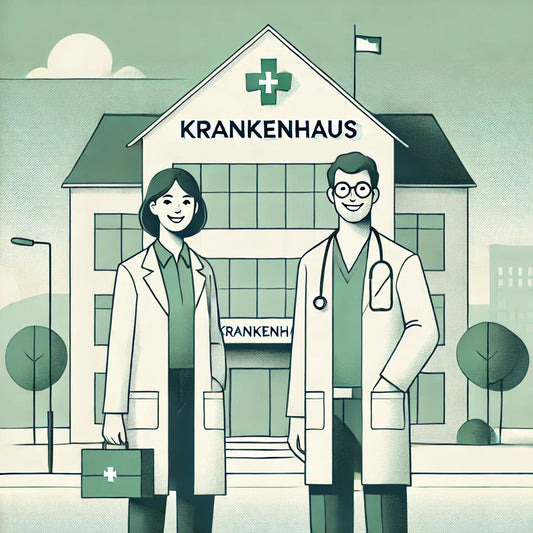So many questions pop up about the topic medical residency in Germany. Sadly, there is a lot of misinformation about the topic on the internet. Let's address some of the burning questions that concern medical professionals including doctors, dentists and pharmacists wanting to start a medical career in Germany.
1. What is the Language for PG in Germany?
The primary language for teaching medical PG in Germany is German. All lectures, patient interactions, and clinical practice are conducted in German. As a result, proficiency in German (usually C1 level) is required before you can enroll in a medical PG program.
For foreign doctors, mastering medical German is crucial, and passing the Fachsprachprüfung (FSP), which tests your medical German, is typically required before starting your residency. There are some English-taught medical programs at undergraduate levels, but postgraduate medical education, particularly for Facharzt (specialist) training, is in German.
2. How Long is PG in Germany?
The duration of a Medical PG degree in Germany depends on the specialization. On average, it takes:
-
4 to 6 years to complete the Facharzt (specialist) training.
- Specializations such as Internal Medicine typically take 5-6 years.
- Fields like General Surgery or Orthopedics may take a similar duration, whereas some might be shorter or longer depending on the requirements and clinical exposure needed.
During the residency program, doctors work in hospitals under supervision while gaining hands-on experience. Unlike other countries, there’s no entrance exam for residency in Germany; instead, securing a position depends on directly applying to the respective department heads for an interview.
Consult Dr. Batra & his Team at RBT
Navigating the process of securing a medical residency in Germany can be complex. The team at Rohit Batra Teach is here to provide exceptional support every step of the way.
Designed for high-performing individuals, our goal is to streamline your journey to securing a medical residency in Germany, allowing you to focus on what matters most—your career development.
3. Is NEET Required for MBBS in Germany?
No, NEET (National Eligibility cum Entrance Test) is not required for admission to MBBS in Germany. While NEET is mandatory for medical studies in India and for Indian students to pursue medical education abroad (for eligibility to practice in India), German medical schools have different admission criteria.
German universities require:
- A strong academic background, especially in science subjects.
- Proficiency in German language (B2 or C1 level).
- Some universities may also require a preparatory year (Studienkolleg) if your qualifications don’t meet the German system’s entry requirements.
4. How to Start PG in Germany after MBBS in India?
To pursue Postgraduate (PG) medical education in Germany after completing MBBS in India, follow these steps:
- Language Proficiency: Master the German language, typically up to C1 level. Additionally, passing the Fachsprachprüfung (FSP) is essential to demonstrate your proficiency in medical German.
- Approbation: Apply for the Approbation, which is the medical license required to practice in Germany. This process includes a review of your medical degree, internship, and work experience. You may need to pass the Kenntnisprüfung if your degree is not recognized as equivalent.
- Residency Application: Once your degree is recognized and you obtain Approbation, you can apply directly to hospitals for medical residency positions (there is no centralized system like the NRMP in the USA).
- Specialization: Residency in Germany, known as Facharztausbildung, typically lasts between 4-6 years depending on the specialization.
5. Is MBBS from India Valid in Germany?
An Indian MBBS degree is not automatically considered equivalent to a German medical degree. Indian MBBS graduates must go through the Approbation process, which involves:
- Submitting your MBBS degree, internship certificates, and other academic documents for review.
- Completing a medical German language exam (Fachsprachprüfung).
- Passing the Kenntnisprüfung if required, to demonstrate that your medical knowledge matches the German standards.
Once these steps are completed, your Indian MBBS degree can be validated, and you can begin practicing in Germany.
6. Is German Necessary to Start PG in Germany after MBBS?
Yes, proficiency in the German language is essential to study PG in Germany. Since all medical residency programs are conducted in German, including patient interactions and lectures, a high level of language proficiency is required.
- C1 level of German is generally required to start your medical residency.
- You must also pass the Fachsprachprüfung, which tests your medical communication skills in German.
Mastering medical German and FSP exam is crucial not only for academic purposes but also for day-to-day interactions with patients, colleagues, and healthcare professionals.
7. Is Indian PG Recognized in Germany?
The answer to this question isn't a straightforward one. A PG degree from India is typically not completely recognized in Germany. If you want to practice as a specialist in Germany, you will need to undergo the Approbation process and may be required to take the Kenntnisprüfung. However to get your years of experience recognized, make sure to prepare all your documents properly otherwise it might just cost you a few extra years of training in Germany. Get in touch with us to know more.
In some cases, Indian doctors may need to complete part or all of the Facharztausbildung (medical residency) in Germany to be recognized as specialists.
8. Is PG in Germany Recognized in India?
The Germany PG degree is valid all over EU and is special in opening doors in the DACH countries. These include Deutschland (Germany), Austria and Switzerland. Unfortunately for doctors who want to complete their PG in Germany and then move back to their home countries such as India, Pakistan, Nepal or Bangladesh, the news isn't as positive as one might expect. The medical PG degree from Germany isn't recognized in these countries because of age-old laws which frankly, do not make sense in the modern world we live in. These countries only recognize degrees from english speaking countries, namely- USA, UK, Australia, New Zealand and Canada.
So if you are an indian doctor wanting to start a medical residency in Germany, make sure you take this information into account before investing your precious time, energy and money in this endeavour.
9. Is Germany Better than the USA and UK for Pursuing a PG Program?
Germany, USA, and UK all offer excellent medical education, but the choice of country depends on several factors, including cost, language, and career goals.
Germany:
-
Pros:
- No tuition fees: Medical residency programs in Germany are typically free at public institutions.
- Paid residency: Doctors in Germany receive a salary during their residency, which can range from €4,500 to €5,500 per month.
- Work-life balance: Germany’s healthcare system emphasizes maintaining a balanced lifestyle for doctors.
-
Cons:
- Language barrier: German proficiency is required, which can be a challenge for non-native speakers.
- Longer path to recognition: If you plan to return to your home country, the recognition process might take additional time and steps.
USA:
-
Pros:
- Advanced medical technology: The USA is known for cutting-edge medical technology and research.
- High earning potential: Salaries for specialists in the USA can be significantly higher compared to Germany or the UK.
-
Cons:
- Extremely competitive: Securing a residency spot in the USA is highly competitive, especially for international medical graduates.
- High cost: Medical education and living expenses can be quite expensive, even for residency programs.
UK:
-
Pros:
- Globally recognized degrees: Medical qualifications from the UK are recognized worldwide.
- Clear training structure: The UK has a well-organized training system with a clear path for progression.
-
Cons:
- Expensive tuition fees: The cost of education and living in the UK is high.
- Residency spots: It may be harder to secure a residency as an international medical graduate due to competition.
Conclusion: Germany stands out for its cost-effectiveness and work-life balance, making it an attractive option for those looking to avoid high tuition fees and still gain world-class medical training.




